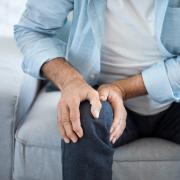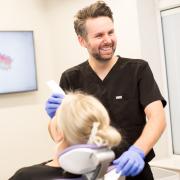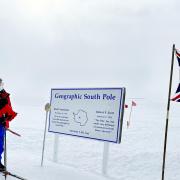Ashley Franklin meets a Belper-based clinician and best-selling author challenging the status quo
‘It’s time to change the way we think about getting older,’ argues Tania Malan, founder of Uniskin, a new Belper-based wellness clinic.
The only one of its kind in the East Midlands, Uniskin is on a bold, unique mission: to reverse ageing and extend lifespan.
'Rather than accepting ageing as an inevitable part of life, we can treat and prevent it; in other words, reverse the ageing process and extend our lives,’ continues Tania.
One such patient said that ‘having conducted a thorough history of my health, Tania was able to give me treatment that has transformed my life.’
Another, Melanie Bonham, is quoted in Tania’s latest book Ageless: The cellular secrets to looking and feeling your best.
‘This book challenges the status quo about ageing and wellbeing’ states Melanie. ‘After reading this book, you will feel empowered to change your life for the better.’
In Tania’s book – already a best seller on Amazon - she explains treatments offered by Uniskin are more than skin deep and not merely cosmetic.
‘The majority of treatments in the aesthetic medicine industry focus on the outside of the body,’ says Tania. ‘Crucially, Uniskin looks inside, too – at our nutrition, hormones and lifestyle choices.’
In the foreword to the book, Dr Shah-Desai, an aesthetic oculoplastic surgeon, describes Tania’s book as an ‘incredible, cutting-edge resource for those wanting to revitalise their face and body sustainably. Every person needs to read this book.’
Tania Malan has had over 30 years’ experience in aesthetic medicine, genetics and trauma, gaining four degrees (three at Masters level), including an MSc in aesthetic medicine.
She has written 28 research papers and treated over 300,000 patients, working in both South Africa and the UK.
Tania’s book is bringing her patients from across the world, with many travelling from afar for treatment.
‘I have had numerous patients telling me they couldn’t put my book down. It’s kick-started many into making changes which includes resolving complex medical issues where their GPs have given up on them,’ she says.
‘What we offer is a potent combination: restoring their facial changes on the outside using aesthetics and renewing and reversing the cellular changes on the inside.’
Tania explains how she came round to this innovative treatment.
‘You don’t need to study long and hard to know ageing is the leading cause of chronic disease and is the result of the cumulative impact of factors such as diet, lifestyle, genetics, and environment.
‘The visible signs of ageing, such as grey hair, wrinkles, and reduced mobility and agility, as well as less visible signs of chronic diseases such as high blood pressure and diabetes, can all have a negative impact on our quality of life.
‘As we get older, the risk of serious conditions like cancer, stroke, and dementia also increases. Despite this, we often accept ageing without questioning it.
‘The burden of ageing on healthcare systems and society is considerable, with millions suffering from deteriorating health and relying on family and community support for care. Despite the fact we are living longer, the quality of our lives may not necessarily be improving because ageing can affect our independence, self-esteem, and our simple enjoyment of life.
‘Furthermore, while the healthcare industry has focused on treating the symptoms of ageing, little attention has been given to tackling the underlying causes.’
Tania believes advancements in genetics are creating opportunities to reverse the effects of ageing and extend lifespan, without disease and disability, both externally and internally.
However, she is eager to point out that aesthetics is misunderstood by many and anxious to counter the horror stories about botched Botox jobs and portrayals of the ‘aesthetic boom’ being a vanity-driven industry.
‘I want to showcase the positive side of aesthetic treatments’ says Tania.
‘Innovations in the field of aesthetic medicine are addressing issues such as hair loss, ageing skin, wrinkles, and changes in fat pads with treatments such as Botox, fillers and facelifts.
‘Despite the benefits these treatments can offer, the media often portrays aesthetic medicine in an unfavourable light, focusing on the negative consequences of substandard practices.
‘However, the reality is that the majority of patients who seek our aesthetic treatments are aiming to improve their confidence and self-worth. They want to look and feel like their former selves or a better version of themselves.
‘We all have an inner age that we want our outer appearance to reflect. The ultimate aim in aesthetics is to restore anatomical changes brought on by ageing.’
Tania argues that the long-held tradition of our healthcare system treating symptoms instead of addressing the root causes of diseases is no longer the only option.
‘We now have the ability to identify and address potential health issues long before they occur through the use of nutrigenetics, nutrigenomics, and pharmacogenomics,’ she says.
‘Without going into explanations of these terms, our approach involves the use of simple blood, saliva, and urine tests to unlock an individual's DNA and create personalised, precise treatment plans that are unique to their needs.
‘By understanding the relationship between genetics and nutrition, we can develop targeted interventions that can help to prevent or treat a wide range of diseases and conditions and may also help to reduce the effects of ageing.’
One example of genetic testing that Tania is keen to highlight is determining the most appropriate hormone replacement therapy for women going through menopause.
‘Hormone supplementation is often based on guesswork, but genetic testing can provide accurate information about which hormones are affected and by how much, allowing for more tailored treatment.
‘Testing for specific hormones, genetic oestrogen tests, and DUTCH (dried urine test for comprehensive hormones) can also provide accurate diagnoses and treatment of hormone levels, which are important for maintaining brain, bone, muscle, and heart health, as well as improving libido and overall well-being long term.
‘All women will experience menopause at some point in their lives, and it is important to accurately diagnose and treat any hormone imbalances that may occur during this time to ensure optimal health and well-being.’
Furthermore, Tania points out that Uniskin’s treatments can even stem the onset of various ailments.
‘Genetic tests can give an early and accurate insight into a person's risk for various diseases and conditions, including cancer, obesity, and hair loss, allowing us to treat and potentially prevent the development of these conditions.’
Tania is not claiming to offer the Elixir of Life but with her wellness clinic demonstrably showing how their many patients are ageing less, she believes Uniskin’s approach to aesthetic medicine could eventually make waves around the world.
‘With my deep understanding of the human body and a passion for preventing and reversing the effects of ageing, I am dedicated to providing high-quality, effective treatments that will enable people to live healthy, fulfilling lives,’ she concludes.
‘I firmly believe that if we take a proactive approach to our health, we can potentially prevent or delay the onset of age-related diseases and improve their quality of our life as we get older, making us feel and look our best while also reducing the economic burden of an ageing society.’
Tania’s book Ageless: The cellular secrets to looking and feeling your best is published by Rethink Press and available in paperback on Amazon, price £18.99.































